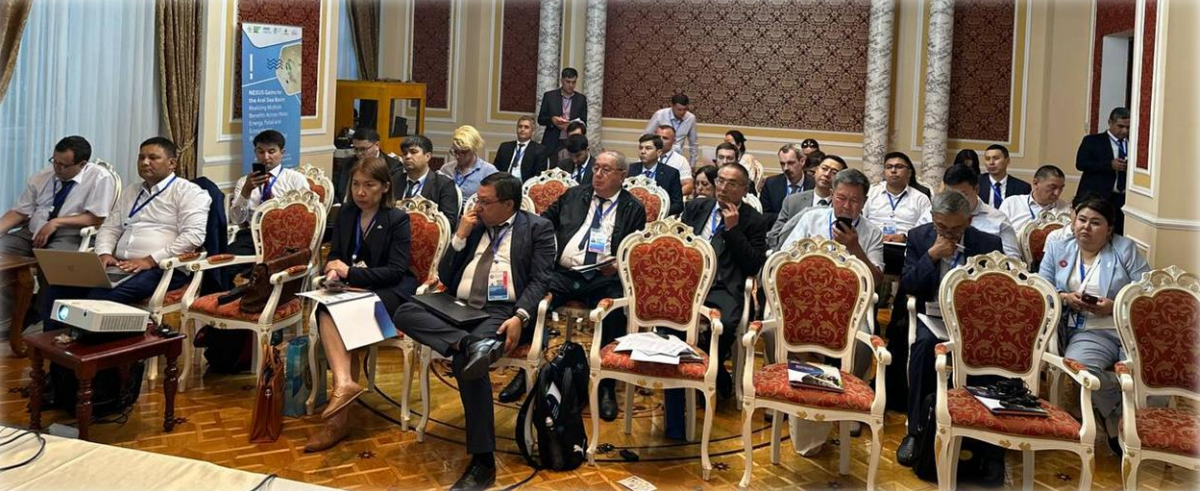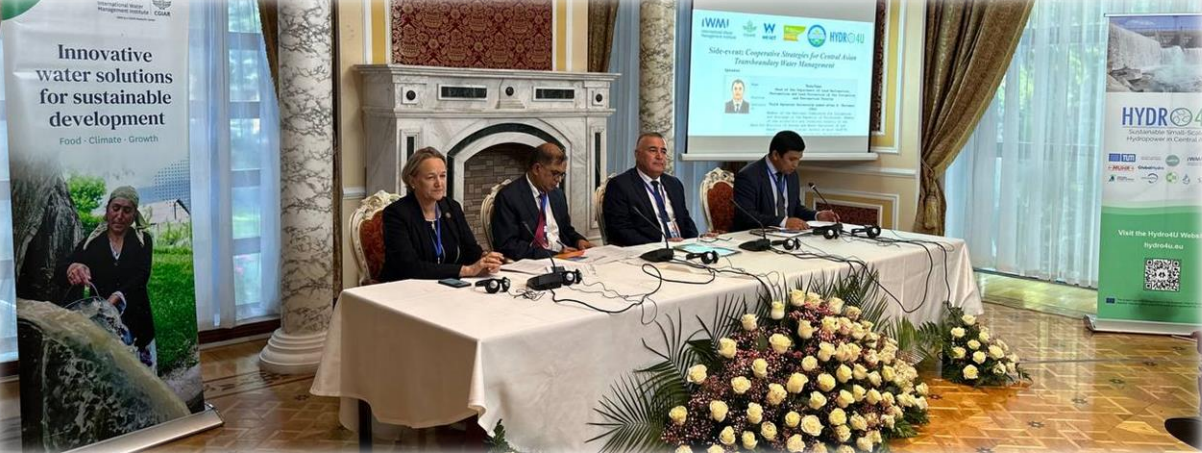Cooperative Strategies for Central Asian Transboundary Water Management
December 18, 2024
The side event on “Cooperative Strategies for Central Asian Transboundary Water Management” was organized on June 11, 2024, in Dushanbe, Tajikistan, under the NEXUS Gains, Hydro4U, and WE-ACT projects, led by the International Water Management Institute (IWMI) in cooperation with the Tajik Agrarian University named Shirinsho Shotemur (TAU). This event brought together policymakers, researchers, development practitioners, and water resource managers to explore practical solutions for promoting inclusive and cooperative transboundary water management in Central Asia. The discussions focused on addressing key challenges, fostering knowledge exchange, and identifying pathways for sustainable water management. The event emphasized the use of science-based solutions, evidence-driven policy frameworks, and capacity-building initiatives to support long-term cooperation and stability in the region.
Event objectives
The primary objective of the event was to strengthen cooperation and promote inclusive strategies for managing transboundary water resources in Central Asia. The event aimed to identify key barriers to cooperation, including institutional, technical, and political challenges, and to propose concrete solutions to overcome them. By focusing on the broader implications of water cooperation for economic growth, environmental sustainability, and regional stability, the event sought to support the development of more resilient and adaptive water governance systems. It also emphasized the role of scientific research and evidence-based policy development in driving long-term, sustainable cooperation. Discussions explored how development projects and national initiatives could be better aligned to achieve a cohesive approach to transboundary water management.
Regional Impact and Beneficiaries
The event served as a platform for a wide range of stakeholders, including government officials, water resource managers, development partners, academic researchers, and representatives of regional and international organizations. By promoting collaboration and dialogue among these stakeholders, the event aimed to foster a shared vision for sustainable water management across the region. The outcomes of this event are expected to have a significant impact on the region’s water governance, economic development, and climate resilience. Enhanced cooperation on transboundary water resources contributes to improved livelihoods, equitable water distribution, and greater regional stability. It also strengthens the capacity of institutions and communities to manage water-related risks, such as floods, droughts, and water scarcity.
Expert Insights and Key Discussions
The event featured insightful discussions and expert contributions on the most pressing issues surrounding transboundary water management in Central Asia. The first session focused on cooperative mechanisms and challenges, offering a comprehensive analysis of existing institutional frameworks and highlighting key gaps that hinder effective collaboration. Experts emphasized the need to strengthen bilateral and multilateral agreements, particularly for the management of small transboundary tributaries (STTs), which often lack formal cooperative frameworks. Attention was drawn to the role of irrigated agriculture as a major water user and the impact of aging infrastructure and climate change on water availability. Policy recommendations included enhancing joint decision-making processes, increasing stakeholder participation, and ensuring a more transparent and inclusive water allocation system.
The role and modernization of Basin Water Organizations (BWOs) emerged as a central theme of the event. These organizations are essential for ensuring fair water allocation, managing shared infrastructure, and facilitating dialogue among riparian states. However, BWOs in Central Asia face technical, financial, and operational constraints that limit their effectiveness. Experts discussed the critical need for modernization, including the adoption of automated water monitoring systems, digital decision-support platforms, and enhanced operational capacity. The integration of advanced technologies, such as Earth observation and satellite-based water monitoring, was seen as a transformative approach to improving transparency and accountability in water allocation.
The third session focused on education, capacity building, and workforce development in the water sector. Experts highlighted the importance of investing in higher education and vocational training to create a skilled and technically proficient workforce capable of addressing the region’s water management challenges. Educational institutions in Tajikistan, Uzbekistan, and Kyrgyzstan have made strides in offering specialized courses on water management, but there is a growing need to integrate advanced technologies, such as hydrological modeling, satellite-based monitoring, and climate risk analysis, into their curricula. Discussions underscored the importance of establishing stronger linkages between academic institutions, water resource agencies, and development organizations to create a pipeline of well-trained water professionals equipped to address emerging challenges.
Key Discussion Themes
The discussions during the event touched on several important themes. Institutional and technical challenges were at the heart of the debate, with participants emphasizing the importance of political will in driving cooperation and advancing cross-border water management initiatives. The limited enforcement of agreements and fragmented decision-making processes were seen as major hurdles that must be addressed to improve cooperation. Another prominent issue was the need to strengthen education and capacity-building programs, especially those aimed at training young professionals in modern water management techniques and the use of digital tools.
The integration of modern technology into water management processes also featured prominently in the discussions. Advances in real-time water monitoring, Earth observation, and decision-support systems have the potential to significantly enhance data-driven decision-making in transboundary water allocation. Experts called for stronger data-sharing protocols and the use of these digital tools to promote transparency and accountability in cross-border water management. Climate change was another recurring theme, as rising temperatures, shrinking glaciers, and altered precipitation patterns place additional pressure on water availability. The need for adaptive strategies to manage water scarcity, floods, and other climate-related challenges was widely acknowledged.

Recommendations and the Way Forward
The event concluded with a series of forward-looking recommendations for fostering more inclusive and cooperative transboundary water management in Central Asia. Strengthening regional cooperation was identified as a priority, with participants calling for the establishment of joint commissions and platforms for dialogue between riparian states. The importance of modernizing water management infrastructure was emphasized, particularly through the use of automated water flow monitoring systems and decision-support tools. These technological upgrades will improve water allocation, increase operational efficiency, and support real-time decision-making.
Another key recommendation was the need to enhance capacity-building efforts through education and professional development programs. Equipping young professionals with the skills to use advanced digital tools, satellite-based monitoring, and evidence-based modeling techniques will support the next generation of water resource managers. This approach will enable the region to create a skilled workforce capable of addressing complex water challenges in the future. The event also emphasized the need for evidence-based policy development, calling for the integration of scientific research and analytical tools into policy processes. Development projects should be used as platforms for testing and scaling innovative solutions, while partnerships with development organizations and regional institutions can help facilitate the sharing of best practices and lessons learned.
Participants highlighted the importance of adopting climate-resilient water management approaches, given the growing impact of climate change on water resources in the region. Adaptive water allocation strategies and flexible policy frameworks are essential to address the growing unpredictability of water availability. Finally, the event called for stronger commitments to data sharing and transparency among stakeholders, as these measures are essential for trust-building and improving cooperation. By facilitating access to timely and reliable data, stakeholders can make better-informed decisions on water allocation and risk management.
Conclusion
The side event on “Cooperative Strategies for Central Asian Transboundary Water Management” demonstrated the critical need for stronger collaboration, capacity development, and evidence-based decision-making to manage shared water resources in Central Asia. Organized under the NEXUS Gains, Hydro4U, and WE-ACT projects by the International Water Management Institute (IWMI) in partnership with Tajik Agrarian University (TAU), the event showcased a range of innovative approaches and actionable recommendations. By promoting dialogue and knowledge exchange, the event laid the foundation for improved cooperation on water management and emphasized the role of education, capacity development, and technical modernization. As climate change, demographic pressures, and economic demands continue to challenge water availability, transboundary cooperation remains essential for ensuring equitable water access and long-term sustainability. The adoption of adaptive, evidence-based, and technology-driven solutions can support more efficient, transparent, and cooperative water management practices. This event marks a crucial step toward strengthening partnerships, modernizing water governance, and promoting sustainable development in Central Asia. By aligning development projects with national strategies and enhancing institutional capacity, the region can better prepare for future challenges while promoting economic growth, environmental protection, and regional stability.
This article was originally published on the Nexus Gains project website and submitted to the Nexus Resource Platform on 04.10.2024 by the Central Asia International Water Management Institute. It was originally written by Zafar Gafurov, Bunyod Holmatov, and Shavkat Kenjabaev.


